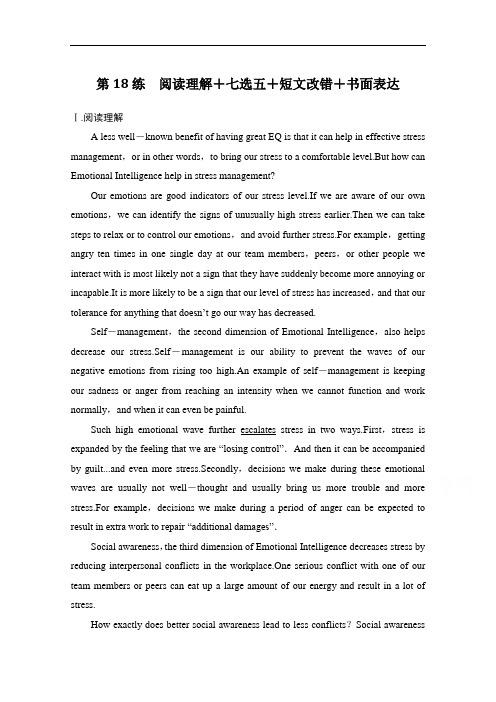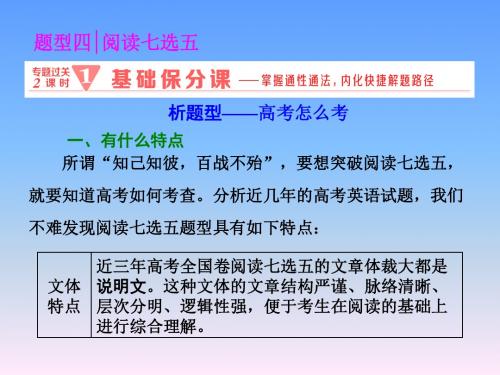2018届高三英语二轮复习课件:专题5 阅读七选五 2.5
- 格式:ppt
- 大小:2.32 MB
- 文档页数:47

第18练阅读理解+七选五+短文改错+书面表达Ⅰ.阅读理解A less well-known benefit of having great EQ is that it can help in effective stress management,or in other words,to bring our stress to a comfortable level.But how can Emotional Intelligence help in stress management?Our emotions are good indicators of our stress level.If we are aware of our own emotions,we can identify the signs of unusually high stress earlier.Then we can take steps to relax or to control our emotions,and avoid further stress.For example,getting angry ten times in one single day at our team members,peers,or other people we interact with is most likely not a sign that they have suddenly become more annoying or incapable.It is more likely to be a sign that our level of stress has increased,and that our tolerance for anything that doesn’t go our way has decreased.Self-management,the second dimension of Emotional Intelligence,also helps decrease our stress.Self-management is our ability to prevent the waves of our negative emotions from rising too high.An example of self-management is keeping our sadness or anger from reaching an intensity when we cannot function and work normally,and when it can even be painful.Such high emotional wave further escalates stress in two ways.First,stress is expanded by the feeling that we are “losing control”.And then it can be accompanied by guilt...and even more stress.Secondly,decisions we make during these emotional waves are usually not well-thought and usually bring us more trouble and more stress.For example,decisions we make during a period of anger can be expected to result in extra work to repair “additional damages”.Social awareness,the third dimension of Emotional Intelligence decreases stress by reducing interpersonal conflicts in the workplace.One serious conflict with one of our team members or peers can eat up a large amount of our energy and result in a lot of stress.How exactly does better social awareness lead to less conflicts?Social awarenessis the ability to recognize emotions in other people,and to handle them resourcefully.In situations when conflicts can easily arise,this skill is particularly useful.By identifying the emotions in our counterpart and then acknowledging these emotions,we can prevent a disagreement from turning into an open personal conflict.As a conclusion,if you are feeling that you are too stressed,I encourage you to look at how you could develop your Emotional Intelligence further.1.Which of the following can best replace the underlined word “escalates” in Paragraph 4?A.Decreases. B.Raises.C.Relieves. D.Substitutes.答案B[词义猜测题。

Passage 1(2017·湖南十三校第一次联考) Every culture has its own unwritten list of behavior that is acceptable.Every society also has its taboos,or types of behavior that are considered a violation of good manners.The word taboo comes from the Tongan language and is used in modern English to describe verbal and nonverbal behavior that is forbidden or to be avoided.__36__They tend to be specific to a culture or country,and usually form around a group’s values and beliefs.What is considered acceptable behavior in one country may be a serious taboo in another.Verbal taboos usually involve topics that people believe are too private to talk about publicly,or relate to one’s manner of speaking.In many cultures,for example,it is considered bad manners to discuss subjects such as sex or religion in public.In some countries,too much volume of one’s voice may annoy people.__37____38__For example,one of the biggest differences among many Western,Asian,and African cultures is the use of eye contact.In the US,people make eye contact when they talk to others.__39__In many Asian and African cultures,however,children are taught to lower their eyes when talking to their elders,or those of higher rank,as a way to show respect.Certain gestures made with the hands can have very different meanings depending on the country you are in.Crossing your middle finger over your forefinger is the sign for good luck in many Western countries.__40__Also,in some Asian countries,moving your hands a lot while talking,or “talking with your hands”,is considered unsuitable.Behavior that is acceptable and non-offensive in one culture can be highly offensive in another.When visiting a foreign country,be aware of some of the basic differences,as this will help to ensure a more enjoyable trip.A. Nonverbal taboos usually relate to body language.B.In Vietnam and Argentina,however,it is a rude gesture.C.In spite of what some people may think,taboos are not universal.D.Cancer is a taboo subject and people are frightened to talk openly about it.E.Learn a country’s customs so that you don’t hurt the local people unconsciously.F.They might think that someone who is speaking or laughing loudly is rude or aggressive.G.If a person avoids eye contact,others might think they are being dishonest or unconfident.语篇解读本文主要讲不同国家习俗方面的禁忌,以及肢体语言、手势语的不同运用。



